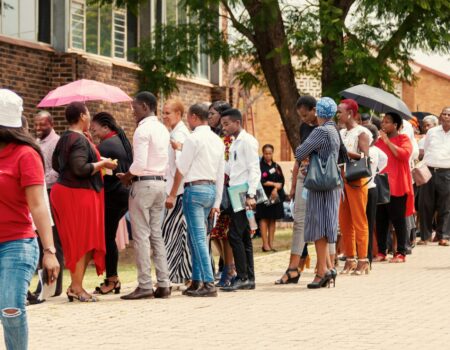Shola remembered the first day she saw red blood cells under the microscope. She was dumbstruck, her jaw heavy on her chest, her eyebrows pushed to her hairline. How could these things be? She wondered.
Then, she saw sperm cells swimming in the semen. Their heads were defined as though they had brains, and their tails were wiggling. They were engines in motion. She wanted to take that sight home.
“Maybe I might not take Microbiology as a career,” she said aloud, “but I’ll always have a soft spot for things ordinary eyes can’t see—the small but mighty.
“Small but mighty?..you ehn,” Adanma, one of her friends and roommate, one of the fabulous four—the name their friendship group had been called since the day they all met at the Senate building—said. They were all flat-chested teenagers bristling with a mix of naivety and academic ambition three years earlier. The years had changed, but also their bodies which were now fuller.
“Go to art class now since everything is artistic to you,” Adanma added as she shoved Shola gently out of the way and slid to her spot.
In their university, which was named one of the best in the country, even microbiology students like them had to share the old and sometimes faulty microscopes. On that day, there were ten of them to one microscope.
On one of the days, Shola told her mother about this messy school situation. “In the beginning, it wasn’t so,” her mother had replied.
For a moment, Shola thought her mother was referring to something in the Bible, as she always did.
“When we were in school, we all had one microscope to ourselves, free meal tickets, we were even two in a room.”
She didn’t let her mother finish.
If Shola had let her mother finish, she would have told Shola tales that were so unbelievable that the only imagery that came to mind were those of colleges in Hollywood movies with large rooms that were brightly painted and furnished like family homes. So she didn’t let her. She never does.
What’s the use of reminiscing about a past for which the present has no resemblance or chance of resembling?
But Shola knew her school was better.
She knew of a university where the medical students spent fourteen years for a six-year course because the school, situated just a few meters from the seat of government, wasn’t accredited because of small things — no equipment, no well-trained lecturers. It was that school that the oldest member of their friendship cum sorority group came from. Jamila was her name.
She was young but already aged with that strain of cynicism familiar with adults who have been assailed with years of accumulated failures.
“Leave this one. Do you know how many times I applied for medicine before they later gave me this microbiology?” Her voice sounded almost musical, thanks to the rusted ceiling fan, a contraption that seemed designed best for noisemaking rather than room cooling.
“What’s she saying?” Timini, whose crop top and cargo pants were visible beneath her white lab coat, had asked that day.
Timini’s story was a little like Jamila’s in that she also had come from another school. As she always told anyone who cared to listen, her offense was that she dared to love a girl openly, unabashedly, loving the girl the way a boy would.
Her parents, she said, had refused to appeal her suspension at the private university and, to teach her a lesson, had sent her to a federal university.
“She’s doing that her writer thing again,” Adanma replied, then stepping aside for the next student to peek at the cells dancing beneath the eyepiece.
“I have told her to chase her dreams, but she’s withering away here chasing a degree,” Timini winked at Shola. Before Shola winked back, she was looking over her head at another girl with dreadlocks and a thin waist.
After that class, they all returned to their hostels, minds and bodies wearied by an education that lacked the means to excite their spirits.
Shola always recalled this conversation because it was the last time that the four of them spent together. They were four young Nigerians, leaders of that nimble tomorrow, each poised to change their world until Nigeria began to happen to them in a series of small unfortunate incidents that left mighty consequences in Shola’s life.
First, it was Jamila who, unlike all of them, members of Gen-Z, a demographic with a disinterest in things like democracy and elections, declared that she would take part as soon as the presidential elections were announced.
It was she who dragged them all to get their voter’s card, rewarding them afterwards with a steaming platter of Indomie noodles and fried eggs.
“We can’t change a thing we are not part of,” she said, grinning as they all fingered the green card.
Shola was more interested in why Taylor Swift had more Spotify streams than Beyonce. And who was a better singer of sad songs between Aurora and Olivia Rodrigo?
She couldn’t care less about IREV’s polling units or ballot boxes. As she always said, Who election help?
Finally, two days after the election, they heard the news. There had been a small fight; someone was shot.
Their friend, Jamila, had died.
Shola’s world pirouetted wildly. How could that happen? Jamila didn’t look like a person who would die; Shola had sobbed to the others.
They had all been quiet. But she knew that their silence didn’t mean that they agreed with her. The grief even became worse when they found out that the democracy Jamila believed in had slipped out from under her feet like a carpet.
Her candidate, the one she convinced them was the best for them as young people, lost.
Shola howled like a wounded animal.
She fisted that annoying plastic voter’s card till it dug ridges in her palms.
She was certain that Jamila would have survived if she hadn’t gone out to vote—if she hadn’t believed in the darn democracy.
The democracy that meant that someone could walk into a place to carry out their democratic rights and be carried out draped in dirty wrappers, a hole drilled in their head.
They sloughed sadly through their lives until one morning, two weeks after they resumed, Shola answered Adanma’s phone, which was charging in the hostel room.
The only word she heard in the flurry of words was “chim o,” but she soon realised that grief doesn’t need words to traverse mediums, and Shola immediately knew that something was wrong.
Walking to the kitchen, where Adanma was covered in a cloud of Oha soup that scented of crushed Oziza seeds and Utazi, was the longest walk of Shola’s life.
She didn’t know where she found the strength, but she held it together as she passed Adanma the phone.
Moments later, Adanma told her the news in a stoical voice—her expression frozen like a sleepwalker trapped in a moment of somnolence.
Unknown gunmen razed her family home at night; everyone escaped except Adanma’s father. Adanma said.
It was later, as Shola read the news, consuming every detail she could find online, that she began to piece it together.
The people’s governor had won, and the opposition, the ruling party’s candidate, had lost. So, the followers of the ruling party’s candidate decided to vent their ire on the street.
That was the way the newspapers had said. It seemed like a small thing, but Shola’s friend lost something mighty—a father, protector, and provider.
But it wasn’t over yet. The pandora’s box still spat more evil.
Three months after Adanma’s loss, both of them, Shola and Adanma, wept beside a creaking hospital bed.
Timini, her body bloodied, lay there whimpering.
She had been set up by a boy posing as a girl on Tinder. If not for a good Samaritan who saw her bloodied body by a dumpsite with “LESBO” spray-painted on her abdomen, she would have died.
The doctors at the teaching hospital, where she was being resuscitated while her parents flew in, said she might make it if her parents came with a sophisticated ambulance.
Shola was twenty-one, but she was old enough to know that citizens were never supposed to get ambulances, especially when they were in a government hospital.
She gritted her teeth as she stared at the image on the wall. She remembered the tribal marks, the way the governor’s glasses sat on the bridge of his nose, the way his belly had reminded her of children with kwashiorkor. But most importantly, she remembered him saying as he cut the tapes in front of red gleaming fire trucks and white ambulances months ago at this same hospital.
“Our state is small, but by Allah, it is mighty, and because you people elected me as your democratically elected governor, I will serve you.”
Shola wondered where those ambulances were. She wondered where Timini’s parents would get sophisticated ones.
She wondered who could have been so wicked to beat a girl like a thief and steal from her. She wondered if people would have been more tolerant of differences and different people if the democratically elected president had been sworn in.
As Shola stared at Timini’s broken body, she was reminded of red blood cells, sperm, and democracy—things the naked eye cannot see. She wondered if there was any reason to still believe in these invisible things. If she should retain her sense of wonder for the human body and lose her wonder forever for the human government, especially the kind in her country.
Oluwakorede Oluwatosin Obaditan
Obaditan Oluwakorede (OBA.T.K) is a Nigerian writer. He works in the private sector as the partner of a microfirm in Lagos, where he lives. His previous works have been published in Kalahari Review, Writer Space Africa, and BlackInk. His X handle is @Kingofkontent.





